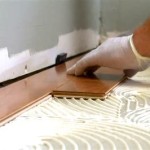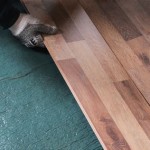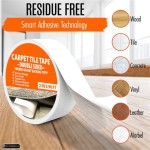Is Vinyl Flooring Better Than Linoleum for Stairs?
When selecting flooring for stairs, durability, safety, and aesthetics are crucial considerations. Both vinyl and linoleum are popular options, but understanding the distinct characteristics of each is essential for making an informed decision.
Durability
Vinyl flooring is generally more durable than linoleum. It is less susceptible to scratches, dents, and wear. The protective top layer of vinyl makes it resistant to high-traffic areas and heavy footfall, making it an ideal choice for stairs that experience significant use.
Slip Resistance
For stairways, slip resistance is paramount. Vinyl flooring often incorporates slip-resistant additives into its surface, enhancing its grip underfoot. Linoleum, on the other hand, may require additional treatments to improve its slip resistance.
Water Resistance
Stairs are prone to spills and moisture. Vinyl flooring is highly water-resistant, making it a suitable choice for areas potentially exposed to moisture. Linoleum, although moderately water-resistant, may become more susceptible to damage if not properly sealed.
Noise Absorption
For a quieter staircase, vinyl flooring is a preferred option. Its multi-layered construction helps absorb noise, reducing the impact of footsteps and other sounds. Linoleum, while not as sound-absorbing as vinyl, still provides a quieter surface compared to hardwood or tile flooring.
Comfort
Vinyl flooring is known for its warmth and comfort underfoot. Its cushioned backing provides a comfortable walking surface, reducing fatigue and pressure on the joints. Linoleum is generally thinner and less resilient, resulting in a firmer surface.
Aesthetics
Both vinyl and linoleum offer a wide range of styles and colors, allowing for customization to match any décor. Vinyl flooring mimics the appearance of natural materials such as wood and stone, while linoleum often features vibrant and patterned designs.
Installation
Vinyl flooring is relatively easy to install, often employing a peel-and-stick method or click-lock system. Linoleum installation requires more specialized skills and may involve adhesive or welding techniques.
Maintenance
Both vinyl and linoleum are low-maintenance flooring options. Regular sweeping or vacuuming removes surface dirt. Vinyl flooring may require occasional polishing or waxing to maintain its shine, while linoleum can be cleaned with mild detergents.
Cost
The cost of vinyl and linoleum flooring varies depending on the specific product, style, and installation method. Generally, vinyl flooring is a more economical option compared to linoleum.
Conclusion
Whether vinyl flooring is better than linoleum for stairs depends on individual preferences and specific requirements. Vinyl flooring excels in durability, slip resistance, water resistance, and comfort. Linoleum offers a wider range of design options and is a more sustainable choice. By carefully considering the pros and cons of each material, homeowners can make an informed decision that best suits their needs.

Pros And Cons Of Installing Vinyl Flooring On Stairs

Pros And Cons Of Installing Vinyl Flooring On Stairs Lx Hausys

Pros And Cons Of Installing Vinyl Flooring On Stairs Lx Hausys

Pros And Cons Of Installing Vinyl Flooring On Stairs Lx Hausys

Pros And Cons Of Installing Vinyl Flooring On Stairs

Pros And Cons Of Installing Vinyl Flooring On Stairs Lx Hausys

Vinyl Flooring On Stairs Pros And Cons Brill

Vinyl Vs Linoleum Flooring Head To Forbes Home

Installing Vinyl Flooring On Stairs Singapore

Installing Vinyl Flooring On Stairs Singapore
See Also







